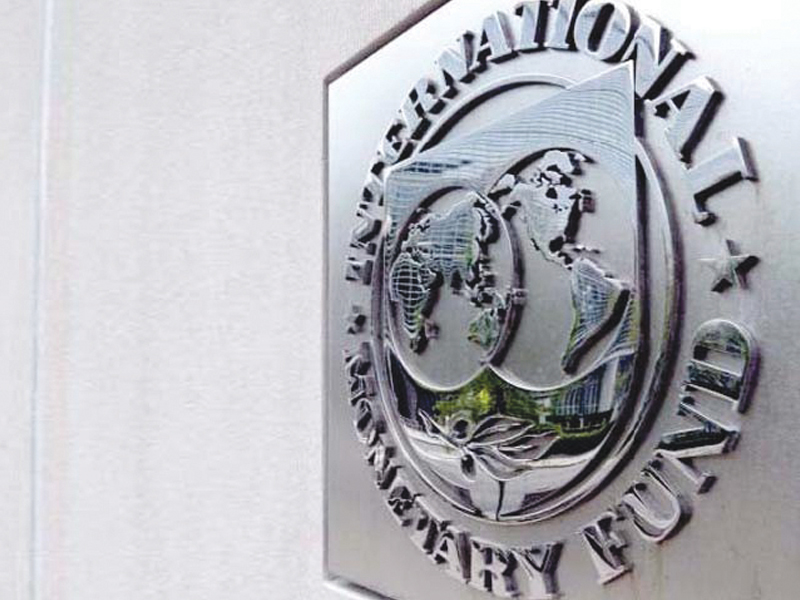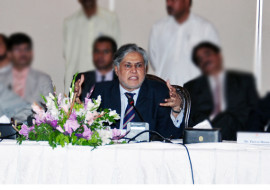
ISLAMABAD:
The drawdown of the North Atlantic Treaty Organisation forces from Afghanistan combined with sectarian violence could increase insurgency activities in Pakistan, posing serious risks to the country’s already flagging economy, said the International Monetary Fund in its newest report.
The report came on the heels of the IMF Executive Board’s approval of a $6.7 billion three-year loan aimed at averting a balance of payment crisis.
The likelihood of heightening risks posed by the security situation was “high-medium”, according to the IMF. The security concerns could increase economic risks, it added.
“Pakistan faces significant insurgency problems in the regions bordering Afghanistan, which could intensify with the drawdown of Nato forces there,” said the report.
Such blatant comments by the IMF on the country’s security and political situation have surprised many analysts who study and understand Pakistan-IMF relations. They said it was the weakness of the Ministry of Finance that allowed the IMF go “deep-down” in assessing the country’s political affairs.

It assessed the security situation as part of its overall assessment of the country in order to check the level of crisis before approving the bailout programme. The report has been prepared by the IMF staff that stayed in Pakistan from June 19 to July 7.
Even the directors of the IMF’s Executive Board recognised the highlighted risks to the new programme from a delicate security situation, revealed the report. It went on to state that sectarian violence in Balochistan and other provinces has been another source of unrest, while street crime in Karachi adds to security concerns. The IMF’s assessment seems true as far as the Karachi situation is concerned.
The IMF observed, “The expected withdrawal of NATO troops from Afghanistan could increase the activities of the Taliban’s Pakistan wing.”
The United States has announced to largely scale down its activities in Afghanistan by December 2014. Many believed in Pakistan that despite a spotty track record of the county the approval of yet another programme by the IMF was a result of Washington’s desire to withdraw its troops by sustaining minimum casualties. These views have been expressed by two former Governors of State Bank of Pakistan, Shahid Kardar and Mohammad Yaqoob.
The report warned of a depreciating rupee due to a heightened security situation and pointed to the already weak private investment and Foreign Direct Investment in the country. Due to an arrangement between Pakistan and the IMF, the rupee has already significantly shed its value against the greenback.
The IMF observed that under unreformed policies, Pakistan’s economic situation will continue to deteriorate and risks of near-term crisis are high. It said that low and declining State Bank reserves leave the country vulnerable to a balance of payments crisis from even relatively minor external or domestic shocks.
The IMF further noted that domestic risks also emanate from the fiscal imbalance with the attendant high government debt rollover requirements, estimated at 30 percent of Gross Domestic Product (GDP).
The IMF said that if the new government did not introduce reforms in the current fiscal year, the budget deficit will remain at 8.1 per cent of the GDP. And to finance such a huge budget deficit the government would continue borrowing money, which will likely increase inflation to the double digits in the coming months.
The IMF has projected that over the medium term, Pakistan’s economy will continue to underperform.
A reform package including significant fiscal consolidation, a more flexible monetary and exchange rate policy, and comprehensive structural reforms would reduce crisis risks stemming from unsustainable fiscal and balance of payments positions, said the IMF.
Pakistan has already agreed to reduce the budget deficit by Rs655 billion or 2.5 per cent of the GDP this year.
The IMF conceded that there were risks to the programme and the reforms that the government promised may not be implemented. “Pakistan’s track record is spotty on sustained adherence to IMF programs, and this will be a relatively high-risk arrangement.”
Published in The Express Tribune, September 13th, 2013.
COMMENTS (5)
Comments are moderated and generally will be posted if they are on-topic and not abusive.
For more information, please see our Comments FAQ




































































@UKP:
Thank you for your kind words. I am still very much around but a bit distracted doing other things.
I understand why there is shock and surprise that the IMF is making "blatant" statements on political economy-security issues.
However, the fact is that many years ago (when I was still there and can recall, if vaguely, attending the Board meeting), the Board asked staff to provide a brief analysis of the political economy context/background in a country that was requesting IMF resources. But the Board cautioned that the analysis should be based on secondary sources since staff was not competent to make judgments on it's own.
In the present case, the staff is simply following the Board's instructions. This is done in all cases where a member-country is seeking a financial arrangement; it is not specific to Pakistan.
As for my comments on the program, I don't have any at this point since I have not read all the documentation. Some economists in Pakistan think the program is weak, while others think that it is overly ambitious and will fail.
IMF should examine LTU Karachi , where to show increased tax collection in July 2013 and August 2013:
1) Sales Tax and Income Tax Refunds are not being issued (compare Refunds issued in same months of 2012 and 2013)
2) Banks ,Insurance companies and Oil companies were forced to pay taxes in "advance". In some cases taxes due on 15 Sep were extracted in August
3) Pitched up false tax demands are being created and tax extracted under force.These demands are reversed in appeal but refunds not given.
Refunds are also not being issued in RTOs and Customs in Karachi just to show enhanced tax collection
Indeed in medium term, no chance of revival of Economy. How can it be, no security, not sufficient power resources, no decent infrastructure. Last 7-8 years have been so horrific that recovery from that will take some time & serious commitment.
I miss comments by Dr. Meekal Ahmed on IMF-related issues. I hope he is doing well. His comments help crystallize the concepts.
beggars cant be choosers... just accept the truth that we are probably in the bottom most list of all countries across all parameters...